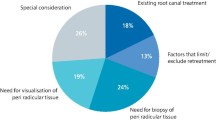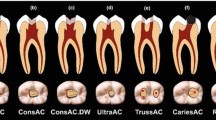Abstract
Introduction The success of root canal treatment (RCTx) relies on the technical quality of the root canal filling, often assessed through radiographic evaluation.
Aims This audit aims to evaluate the technical proficiency of Peninsula Dental School (PDS) undergraduate dental students in RCTx, comparing it with established European standards.
Design Conducted as a retrospective study, this evaluation focuses on assessing the technical quality of RCTx performed by undergraduate dental students at PDS across various academic years.
Setting PDS, a primary care-based dental school in the UK, serves as the focal point for this evaluation.
Materials and methods Reviewed 2021-2022 endodontic cases by supervised undergraduates. Analysed radiographs for obturation, voids and errors based on established benchmarks. Randomly selected unbiased cases, assessing voids, filling proximity, missed canals and canal anatomy preservation.
Interventions Comparative analysis of RCTx quality between PDS students and counterparts from other dental schools, exemplified by Dublin Dental University Hospital (DDUH).
Results Findings revealed that 62.07% of single-rooted and 60% of multi-rooted teeth treated by PDS students met European standards.
Discussion The implications highlight the proficiency of PDS students in RCTx, comparing favourably to DDUH.
Conclusion Recommendations emphasise conducting regular educational audits in dental schools to continually enhance RCTx techniques and ensure high-quality clinical teaching.
Key points
-
Favourable comparative performance: Peninsula Dental School students matched or slightly surpassed peers in root canal treatment (RCTx) proficiency, showcasing effective teaching and clinical training.
-
Impact of voids and alternative techniques: voids notably affected RCTx outcomes. Recommending alternate techniques (for example, single cone, hydraulic cement) to diminish voids for better acceptability.
-
Educational audits for enhancement: stressing dental school audits to continually refine clinical teaching. Identifying areas for RCTx improvement ensures ongoing betterment in patient care quality.
This is a preview of subscription content, access via your institution
Access options
Subscribe to this journal
Receive 24 print issues and online access
$259.00 per year
only $10.79 per issue
Buy this article
- Purchase on Springer Link
- Instant access to full article PDF
Prices may be subject to local taxes which are calculated during checkout



Similar content being viewed by others
References
Kumar M, Duncan H F. Radiographic evaluation of the technical quality of undergraduate endodontic ‘competence' cases in the Dublin Dental University Hospital an audit. J Ir Dent Assoc 2012; 58: 162-166.
Donnelly A, Coffey D, Duncan H F. A re-audit of the technical quality of undergraduate root canal treatment after the introduction of new technology and teaching practices. Int Endod J 2017; 50: 941-950.
De Moor R, Hülsmann M, Kirkevang L-L, Tanalp J, Whitworth J. Undergraduate curriculum guidelines for endodontology. Int Endod J 2013; 46: 1105-1114.
Ng Y-L, Mann V, Rahbaran S, Lewsey J, Gulabivala K. Outcome of primary root canal treatment: systematic review of the literature - Part 2. Influence of clinical factors. Int Endod J 2008; 41: 6-31.
Moussa-Badran S, Roy B, Bessart du Parc A S, Bruyant M, Lefevre B, Maurin J C. Technical quality of root fillings performed by dental students at the dental teaching centre in Reims, France. Int Endod J 2008; 41: 679-684.
European Society of Endodontology. Quality guidelines for endodontic treatment: consensus report of the European Society of Endodontology. Int Endod J 2006; 39: 921-930.
Schäfer E, Bürklein S. Impact of nickel-titanium instrumentation of the root canal on clinical outcomes: a focused review. Odontology 2012; 100: 130-136.
Hayes S J, Gibson M, Hammond M, Bryant S T, Dummer P M. An audit of root canal treatment performed by undergraduate students. Int Endod J 2001; 34: 501-505.
Qualtrough A J, Whitworth J M, Dummer P M. Preclinical endodontology: an international comparison. Int Endod J 1999; 32: 406-414.
Balto H, Al Khalifah S, Al Mugairin S, Al Deeb M, Al-Madi E. Technical quality of root fillings performed by undergraduate students in Saudi Arabia. Int Endod J 2010; 43: 292-300.
Khabbaz M G, Protogerou E, Douka E. Radiographic quality of root fillings performed by undergraduate students. Int Endod J 2010; 43: 499-508.
Sjogren U, Hagglund B, Sundqvist G, Wing K. Factors affecting the long-term results of endodontic treatment. J Endod 1990; 16: 498-504.
Bołtacz-Rzepkowska E, Pawlicka H. Radiographic features and outcome of root canal treatment carried out in the Łódź region of Poland. Int Endod J 2003; 36: 27-32.
Burke F M, Lynch C D, Ní Ríordáin, R, Hannigan A. Technical quality of root canal fillings performed in a dental school and the associated retention of root-filled teeth: a clinical follow-up study over a 5-year period. J Oral Rehabil 2009; 36: 508-515.
Ng Y-L, Mann V, Gulabivala K. A prospective study of the factors affecting outcomes of nonsurgical root canal treatment: part 1: periapical health. Int Endod J 2011; 44: 583-609.
Ng Y-L, Mann V, Gulabivala K. A prospective study of the factors affecting outcomes of non-surgical root canal treatment: part 2: tooth survival. Int Endod J 2011; 44: 610-625.
Author information
Authors and Affiliations
Contributions
This paper was developed by Araz Ahmed and Ewen McColl, who also oversaw its editing process. Federico Foschi and Henry F. Duncan provided valuable insights and contributed to the editing phase. Araz Ahmed serves as the primary author, while Ewen McColl acts as the corresponding author for this publication.
Corresponding author
Ethics declarations
None of the authors have any conflicts of interest.
The audit was registered with the University of Plymouth, Faculty of Health, Research Ethics and Integrity Committee. It was agreed that ethical approval was not required for this audit as this was a retrospective analysis of clinical records and all patient consent for radiographs and endodontic treatment had already been obtained in line with Peninsula Dental Social Enterprise consent policy. Appropriate consent gained for clinical images and data.
Data availability
For access to the data supporting our study's conclusions, please contact the corresponding author. However, due to patient data confidentiality and in adherence to the Data Protection Act of 2018, we are unable to publicly share this data.
Rights and permissions
Springer Nature or its licensor (e.g. a society or other partner) holds exclusive rights to this article under a publishing agreement with the author(s) or other rightsholder(s); author self-archiving of the accepted manuscript version of this article is solely governed by the terms of such publishing agreement and applicable law.
About this article
Cite this article
Ahmed, A., Foschi, F., Duncan, H. et al. Investigating the technical quality of undergraduate endodontic treatment in a primary care-based dental school. Br Dent J (2024). https://doi.org/10.1038/s41415-024-7130-4
Received:
Revised:
Accepted:
Published:
DOI: https://doi.org/10.1038/s41415-024-7130-4



